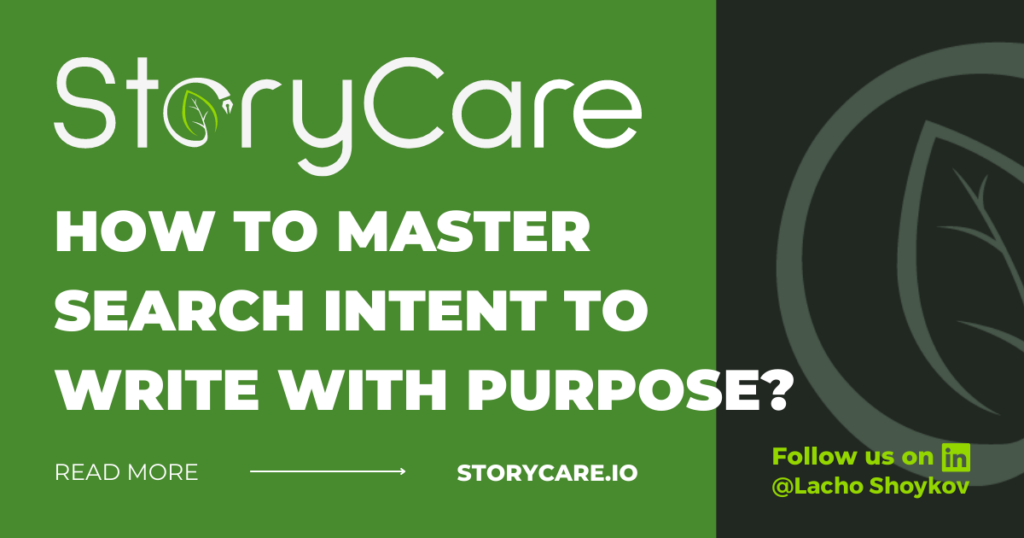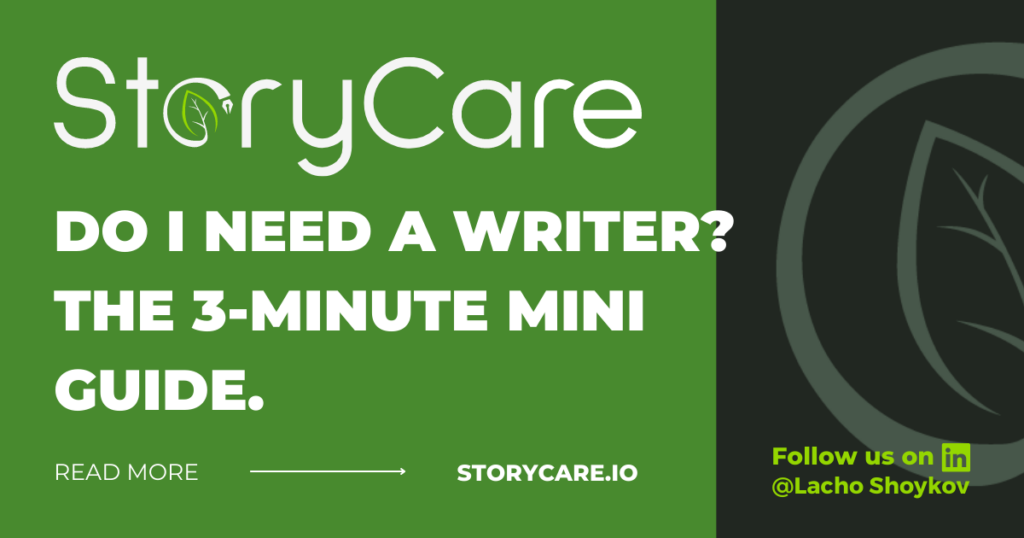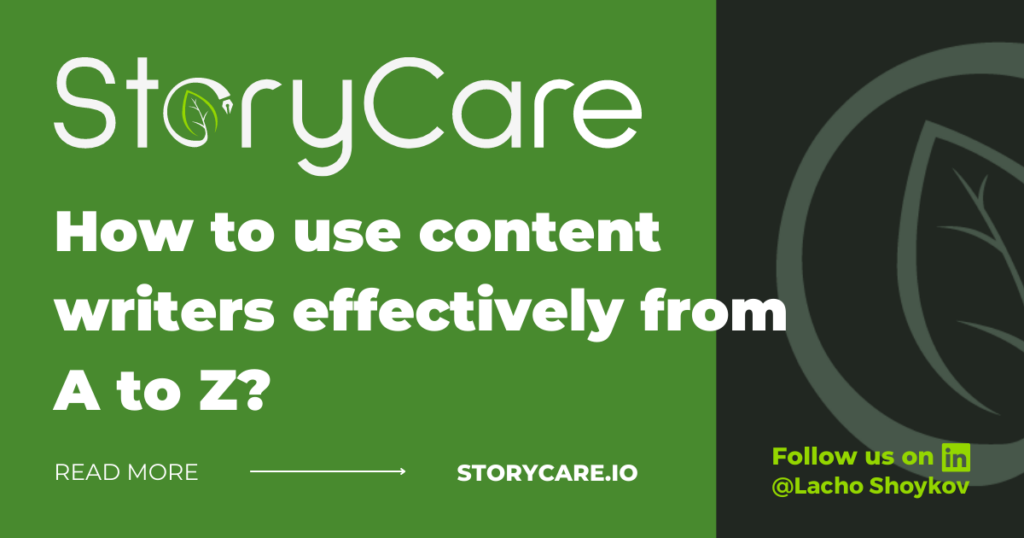How to master purposeful writing with search intent?
Search intent is all about understanding what is the right message at the right time for your audience. If you figure out precisely what that is, you can even get away with subpar execution.
Oppositely, even perfect writing cannot compensate if your message misses the target. So how do you figure out what to write? Mastering search intent is a great starting point for understanding your audience’s needs at every level of their buyer\’s journey.

In this article:
Table of Contents
What is search intent?

Search Intent, also known as “User Intent” and “Audience Intent,” is the term used to describe the purpose of an online search.
Whenever someone uses search engines like Google, they are looking for something. They immediately move on when they don’t find what they are looking for.
As the all-seeing big brother that Google is, it notes the performance of the top results for each query. If they engage users, they keep their leading position. If they fail, they die slowly on Google’s second page.
After all, Google’s mission is to “organize the world’s information and make it universally accessible and useful.”
How to use search intent?
So how do you figure out what content to create to match the intent of each query? Easy – you look at the websites already ranking in the top positions when you try to Google something. An important note is that Google personalizes your search results, so a VPN is great for seeing the results page from a neutral point of view.
Do the results have anything to do with your business? If yes,
can you outrank the competitors? If yes, you’ve found a great content opportunity.
If they are too strong, creating similar content with a new twist may be worthwhile. If the results are entirely unrelated, you must avoid creating content and go back to the planning board.
Types of Search Intent
Through analyzing a mind-boggling amount of data, Google has learned to distinguish what result is the best to serve for each query. Thus, it is always best to go with the flow of search results instead of trying to create a new trend.
Now that you understand the basic principles behind search intent, let’s dive into the main categories of queries – Informational, Transactional, Navigational, and Commercial.
Informational Search Intent

The most straightforward search intent is the informational one. People have a question or are missing information, so they open Google to try and find it. It can be the weather, the actor cast of a movie they watched, a guide on how to write effectively, a list of the crucial principles of storytelling, and much more.
Businesses typically create lists and how-to guides to address informational intent or compare different solutions and alternatives and explain what works best. But, again, it’s all about informing the user.
Transactional Search Intent

A person who is ready to take an action shows transactional search intent. They either want to use a tool or make a purchase at that very moment. Usually, this means they have a higher awareness level and don’t need to be explained the basics. They aren’t looking so much for the information as for a direct solution.
Businesses usually capture transactional queries with landing, service, tool, or shop pages. Whatever can help the user take immediate action.
Navigational Search Intent

When a person is looking for a specific website this is considered Navigational Search Intent. For example, “Netflix,” “Amazon,” “Facebook,” “SEMrush,” and “Ahrefs” are all navigational queries. This is because people are trying to navigate to them through Google instead of visiting them directly.
Such queries leave very little room for competitors to enter the scene, and it might be better to avoid wasting resources fighting an uphill battle.
If you are dead set on trying to infiltrate the search results, you can try creating informational resources, such as “brand alternatives.” This can allow you to capture traffic from your competitors directly. Big rivaling companies sometimes run their Google ads whenever someone looks up their competitors.
Commercial Investigation Search Intent

When people are interested in buying a product or a service but need more information before deciding, this signals Commercial Investigation Search Intent. These people are aware of their problems but need to be made aware of the best solution. So they investigate the best softwares, cars, washing machines, Thai massage services in their area, and so on.
Businesses usually try to serve commercial queries by creating guides that list multiple solutions, like the 37 best solutions for using less energy at home. Such content requires a balance between serving transactional and informational user intents.
Hybrid Search Intent

Many search queries cannot be strictly defined as belonging to the above categories. Instead, they are hybrid and combine the properties of two or more categories. You can easily recognize hybrid intent when you see that Google’s results page doesn’t show a single type of content but rather a mix of types.
A human way of thinking about search intent
An easier way to think about search intent is the customer levels of awareness. How ready is the person to solve their problem? Here are the five levels of awareness:
Unaware
People who are unaware have no idea their problem even exists. For example, let’s say they have a car that always makes a funny sound when they start it, but they never notice until a friend points it out to them. So they become aware they have a problem.
Problem Aware = Informational Query
People who are aware that a problem exists but have yet to learn what caused it or what could solve it are problem aware. What they need is information to find out what the problem is. For example, a problem-aware person could ask, “Why is my car making strange noises?”. This is an informational query and will be met by broad-scope informational resources outlining common reasons.
Solution Aware = Commercial Investigation
After looking up the most common reasons, these people find that the most cited advice is to take the car to a mechanic for inspection. So they decide to Google “best car mechanics near me.” This is a commercial investigation query. They know they need a mechanic, but they don’t know which one to go to. Google will likely serve them lists of mechanic services to aid them in their quest.
Product / Service Aware = Transactional + Navigational
After comparing alternatives, they decide to call one of the mechanics in town who looks reliable. So they google “CarDoctor London contact. This is now a mix of transactional and navigational queries. Finally, they set up an appointment and get their car checked.
Most Aware
Sometime after their appointment, they get into a friend\’s car and notice their car is making a funny sound, but their friend doesn’t seem to notice. So they point the problem out and tell them what the most likely cause is and that CarDoctor fixed it for them. These people are now so aware they are ready to recommend specific services and solutions to them.
Final Thoughts on Search Intent

Understanding search intent is a great way to understand what users are trying to accomplish at every query so that you can adjust your content accordingly. It\’s almost like reading minds! Moreover, search intent builds upon much older
marketing frameworks and applies them to Search Engines. Finally, I hope you found this guide interesting and helpful!

 Search Intent, also known as “User Intent” and “Audience Intent,” is the term used to describe the purpose of an online search.
Whenever someone uses search engines like Google, they are looking for something. They immediately move on when they don’t find what they are looking for.
As the all-seeing big brother that Google is, it notes the performance of the top results for each query. If they engage users, they keep their leading position. If they fail, they die slowly on Google’s second page.
After all, Google’s mission is to “organize the world’s information and make it universally accessible and useful.”
Search Intent, also known as “User Intent” and “Audience Intent,” is the term used to describe the purpose of an online search.
Whenever someone uses search engines like Google, they are looking for something. They immediately move on when they don’t find what they are looking for.
As the all-seeing big brother that Google is, it notes the performance of the top results for each query. If they engage users, they keep their leading position. If they fail, they die slowly on Google’s second page.
After all, Google’s mission is to “organize the world’s information and make it universally accessible and useful.”
 The most straightforward search intent is the informational one. People have a question or are missing information, so they open Google to try and find it. It can be the weather, the actor cast of a movie they watched, a guide on how to write effectively, a list of the crucial principles of storytelling, and much more.
Businesses typically create lists and how-to guides to address informational intent or compare different solutions and alternatives and explain what works best. But, again, it’s all about informing the user.
The most straightforward search intent is the informational one. People have a question or are missing information, so they open Google to try and find it. It can be the weather, the actor cast of a movie they watched, a guide on how to write effectively, a list of the crucial principles of storytelling, and much more.
Businesses typically create lists and how-to guides to address informational intent or compare different solutions and alternatives and explain what works best. But, again, it’s all about informing the user.
 A person who is ready to take an action shows transactional search intent. They either want to use a tool or make a purchase at that very moment. Usually, this means they have a higher awareness level and don’t need to be explained the basics. They aren’t looking so much for the information as for a direct solution.
Businesses usually capture transactional queries with landing, service, tool, or shop pages. Whatever can help the user take immediate action.
A person who is ready to take an action shows transactional search intent. They either want to use a tool or make a purchase at that very moment. Usually, this means they have a higher awareness level and don’t need to be explained the basics. They aren’t looking so much for the information as for a direct solution.
Businesses usually capture transactional queries with landing, service, tool, or shop pages. Whatever can help the user take immediate action.
 When a person is looking for a specific website this is considered Navigational Search Intent. For example, “Netflix,” “Amazon,” “Facebook,” “SEMrush,” and “Ahrefs” are all navigational queries. This is because people are trying to navigate to them through Google instead of visiting them directly.
Such queries leave very little room for competitors to enter the scene, and it might be better to avoid wasting resources fighting an uphill battle.
If you are dead set on trying to infiltrate the search results, you can try creating informational resources, such as “brand alternatives.” This can allow you to capture traffic from your competitors directly. Big rivaling companies sometimes run their Google ads whenever someone looks up their competitors.
When a person is looking for a specific website this is considered Navigational Search Intent. For example, “Netflix,” “Amazon,” “Facebook,” “SEMrush,” and “Ahrefs” are all navigational queries. This is because people are trying to navigate to them through Google instead of visiting them directly.
Such queries leave very little room for competitors to enter the scene, and it might be better to avoid wasting resources fighting an uphill battle.
If you are dead set on trying to infiltrate the search results, you can try creating informational resources, such as “brand alternatives.” This can allow you to capture traffic from your competitors directly. Big rivaling companies sometimes run their Google ads whenever someone looks up their competitors.
 When people are interested in buying a product or a service but need more information before deciding, this signals Commercial Investigation Search Intent. These people are aware of their problems but need to be made aware of the best solution. So they investigate the best softwares, cars, washing machines, Thai massage services in their area, and so on.
Businesses usually try to serve commercial queries by creating guides that list multiple solutions, like the 37 best solutions for using less energy at home. Such content requires a balance between serving transactional and informational user intents.
When people are interested in buying a product or a service but need more information before deciding, this signals Commercial Investigation Search Intent. These people are aware of their problems but need to be made aware of the best solution. So they investigate the best softwares, cars, washing machines, Thai massage services in their area, and so on.
Businesses usually try to serve commercial queries by creating guides that list multiple solutions, like the 37 best solutions for using less energy at home. Such content requires a balance between serving transactional and informational user intents.
 Many search queries cannot be strictly defined as belonging to the above categories. Instead, they are hybrid and combine the properties of two or more categories. You can easily recognize hybrid intent when you see that Google’s results page doesn’t show a single type of content but rather a mix of types.
Many search queries cannot be strictly defined as belonging to the above categories. Instead, they are hybrid and combine the properties of two or more categories. You can easily recognize hybrid intent when you see that Google’s results page doesn’t show a single type of content but rather a mix of types.
 Understanding search intent is a great way to understand what users are trying to accomplish at every query so that you can adjust your content accordingly. It\’s almost like reading minds! Moreover, search intent builds upon much older marketing frameworks and applies them to Search Engines. Finally, I hope you found this guide interesting and helpful!
Understanding search intent is a great way to understand what users are trying to accomplish at every query so that you can adjust your content accordingly. It\’s almost like reading minds! Moreover, search intent builds upon much older marketing frameworks and applies them to Search Engines. Finally, I hope you found this guide interesting and helpful! 

